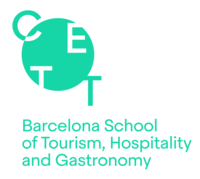The coronavirus crisis has brought a sudden halt to our daily lives. Among the various spheres of activity that have been affected, tourism, as an activity based on human mobility and contact, has suffered directly from the consequences of policies to contain the outbreak.
However, although this year and possibly the next few years will be difficult for companies in the sector, tourism as an activity does not seem to be going to disappear in the mid-term. We can sense this through the testimonies that we find in social networks where we see that people are eagerly awaiting the opportunity to meet again with their friends and loved ones; as well as to leave their homes and visit different places that have not been within their reach during these months of confinement. Thus, in the future, the value of travel to our life experience may even be reaffirmed and the interest in travel increased.
However, even if we say that the motivation for tourism is not going to disappear, we cannot deny that there are various views on tourism that force us to rethink the sector. On the one hand, during the pre-pandemic scenario, society had become aware of the negative externalities of the tourism sector. Along these lines, the period of confinement made it possible to confirm the environmental stress to which the tourist destinations were subjected, one of the recurrent themes being the crystal-clear water of the Venice canals or the abrupt reduction in air traffic. On the other hand, the crisis generated by the pandemic has made even more urgent the need to secure and dignify tourism jobs. Other aspects that might define the new forms of tourism are the need to establish genuine contact between residents and visitors, and to this end it is necessary to promote meeting places for both groups in order to avoid the emptiness of some urban spaces that are intensely devoted to tourism. Furthermore, it is undeniable that the
Covid-19 and its effects, as well as the personal suffering of each specific case, have generated a context of fear before any action that we perceive increases the risk of infection and, as individuals, we have been charged with the responsibility of minimizing the spread of the pandemic.
In this sense, tourism companies and destinations must be able to integrate these different dynamics and adapt to the new scenarios that may arise from the dialogue between the different aspects mentioned.
In this context, the concept of ethics appears to be relevant. This is the case for two reasons. Firstly, because ethics, as a discipline, is not so much concerned with a descriptive knowledge of reality, but is based on practical knowledge, allowing reflection on how reality should be configured. In an age of uncertainty like the one we are living in and in which, as we have said, tourism must provide a response to the confluence of different trends, the reflective and propositional approach of ethics is useful for outlining and defining new strategies and good practices. Secondly, because understanding tourism from an ethical perspective makes it possible to place values such as dialogue, trust, hospitality and social responsibility, among others, at the centre of the tourism discourse. These values make it possible to redefine the role that tourism companies and administrations should play in the tourist destination in order to establish a relationship of trust with society, as well as to place the human dimension of tourism at the centre of tourist activity, that is, the active encounter between people of different origins. It is in this way that ethics can help to bring about a transformation of the current situation, making a positive contribution both to the destination society and to the traveller by offering a truly transformative experience.

